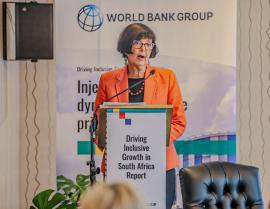The South African government, striving to invigorate the nation’s logistics sector, unveiled critical reforms aimed at enhancing export capabilities and economic stability.
Transport Minister Barbara Creecy emphasized these developments during the launch of the World Bank report,
“Driving Inclusive Growth in South Africa: Quick Wins with Competitive Markets and Efficient Institutions,” held in Johannesburg on Friday.
With the National Logistics Crisis Committee (NLCC) established, South Africa aims to secure strategic trade corridors, modernize infrastructure, and combat inefficiencies affecting ports and rail networks. The ambitious target: move 250 million tonnes of freight annually by 2030, up from 150 million in 2023/24.
Addressing the fundamentals who, what, where, when, why, and how Minister Creecy revealed that collaboration with private sectors forms a cornerstone of this strategy.
Efforts to tackle backlogs at border crossings and alleviate highway congestion are supported by active participation from the Presidency, various governmental departments, and private entities.
Private Sector Investment and Rail Rejuvenation
Key to these reforms is the rejuvenation of the rail sector, underpinned by the 2022 White Paper on National Rail Policy. Structural transformations aim to foster private investment and ensure the rail system’s equitable and sustainable development.
A Private Sector Participation (PSP) Unit, in collaboration with the Development Bank of Southern Africa, has begun soliciting private capital for critical rail projects, ensuring infrastructure remains under public ownership.
Crucial Port Recovery Measures
Minister Creecy addressed inefficiencies in ports management, pointing to an ongoing recovery plan that emphasizes replacing outdated infrastructure, securing spare machinery parts, and bolstering collaboration between public and private stakeholders.
Ports have already reduced ship waiting times and improved truck queuing systems as a result of these measures.
Impact on the Global Market
With a significant share of South African exports reliant on streamlined logistics, these initiatives are critical not only for local economic growth but also for strengthening the country’s competitiveness in global trade.
Achieving the set targets will demand significant private-public investments in technology, infrastructure, and rolling stock.
The logistics overhaul, driven by best practices and technical expertise from partnerships, promises long-term benefits for investors, exporters, and citizens alike.
Minister Creecy concluded, “We cannot continue with the status quo…where derailments and port blockages cost our economy billions of rands. These ambitious targets can only be achieved through partnerships.”
Source:SAnews
Read More:Eskom’s Swift Action Boosts National Grid Amidst Crisis – Jaina News
South Africa’s Landmark Land Expropriation Act Raises Questions – Jaina News
Empowering South Africans: Data-Driven Energy Transition Campaign Launched – Jaina News








